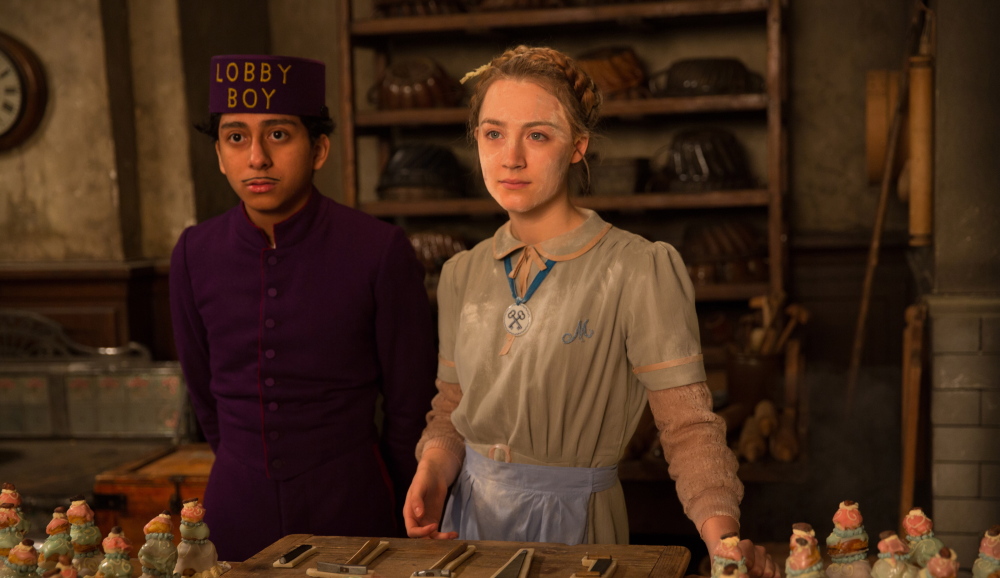“Room service? Send up a larger room.”
— Groucho Marx
My plans for spring break travel have changed. I was going to check in at the “Best Marigold Hotel,” but now, after I’ve seen Wes Anderson’s fresh, sparkling, dynamic, insane, comedic masterpiece, I’ve booked rooms at the “Grand Budapest Hotel.”
I know I will be well looked after by the maitre de, Monsieur Gustave H. (a breathtaking Ralph Fiennes) and his newly hired “Lobby Boy” (Tony Revolori). Gustave and Lobby Boy will become the best comic duo since Groucho and Harpo, and maybe Laurel and Hardy.
I’ve been waiting for Wes Anderson to do another human clutter up like his “Royal Tenenbaums,” because his “Moonrise Kingdom” merely annoyed me. Wes must have heard me because here it is, “The Grand Budapest Hotel,” his best, for me, since “The Darjeeling Limited,” which I adored. If you liked those characters, good news, they’re all back, along with a “cast of thousands:” Bob Balaban, Bill Murray, Adrian Brody, Owen Wilson, Harvey Keitel, Edward Norton, and the masterful, evil touch of the great F. Murray Abraham as “Mr. Moustafa.”
So fasten your seatbelts and come along into the semi fictional European world of the Republic of Zubrowka, sometime in Anderson’s candied up Europe of the 30s.
Anderson begins his story at the end, and then packs us up and takes us back. We begin in 1968 at a once fabulous hotel now in decline. It’s like a huge Hotel Six in the Ukraine. If you’re old enough, try to imagine Edmund Goulding’s fabulous and historic 1932 “Grand Hotel” as though it had been written by the Marx Brothers. That’s a good start. Then picture your first view of the facade as if Downton Abbey had been built by Walt Disney.
The wallpaper at the decaying Grand Budapest Hotel is peeling, one or two mysterious inhabitants are lurking in the tattered lobby. It’s as if Stalin and assorted hard liners had partied hard and left it wet and broken.
We’ve been brought here by our narrator, an aging writer, (Tom Wilkinson) who, as we move along, becomes his younger self (Jude Law) one of the lurkers near the front desk.
I won’t waste your time going through frame by frame of this once and forever comic classic, because it needs your eyes to see the glamour, the stunning sets and costumes, your ears to hear the throbbing, thundering balalaika musical score, as the bizarre cast of hundreds dash through Stanley Kubrick’s haunted carpeted halls, slide into the Marx Brother’s tiny golden elevator, and dine on rabbit and champagne once served by Franklin Pangborn with Ernst Lubitsch and Billy Wilder watching from the bar.
On your journey, you will meet Ralph Fiennes as Gustave H. the best role of his career in my opinion. His Gustave H. is a man of old-school manners, who can also snap out an obscene zinger when being pursued by evil doers: Dimitri, a fabulous Adrien Brody in waxed mustache, having the time of his life in Dracula’s overcoat, and his aide de camp, a son of Frankenstein, leather coated motorcycle vampire lipped killer, a brilliant Willem Dafoe, who likes to kill people’s pets.
Yes, that 80-year-old dowager Madame D., is indeed the incredible Tilda Swinton looking 198. Madame D. was also, at age 95, a lover to a younger Gustave. “I sleep with all my friends,” he sighs. Her “second” rewritten will light the fuse for the oncoming nuclear explosion.
Lobby Boy and the kitchen maid (Saoirse Ronan) who has a birthmark on her face in the shape of Mexico, will fall in love and aid Gustave in the theft of “Boy With an Apple,” a priceless painting left by Madame D.
There will be a hilarious month in a prison gulag styled by Joseph Stalin in the pay of Warner Brothers. You will hold your breath in chases up and down the Alps, motorcycle and bobsled chases around mountain passes, and a fabulous prison break in the style of the great comedy directors, Preston Sturges and the Cohen Brothers.
You’ll be quite happy with Anderson’s cast of our favorite comedians. Is that Bill Murray taking reservations? Yes. OMG, is that Jeff Goldblum in the Charlie Chan glasses? Edward Norton as a Prussian officer? Right again, with more surprises to come.
Anderson’s script, inspired by the writings of Stefan Zweig, is a land mine of comedy one liners, delivered so fast you’ll need to sit through the movie again just to collect them. Billy Wilder and Ernst Lubitsch would be envious.
Send flowers to Milena Canonero’s costume designs, Adam Stockhausen’s inventions, and give cinematographer Robert Yeoman his Oscar now. “Grand Budapest Hotel” is only one hour and 40 minutes long. I wish it had been four.
J.P. Devine is a former stage and screen actor.
Send questions/comments to the editors.


